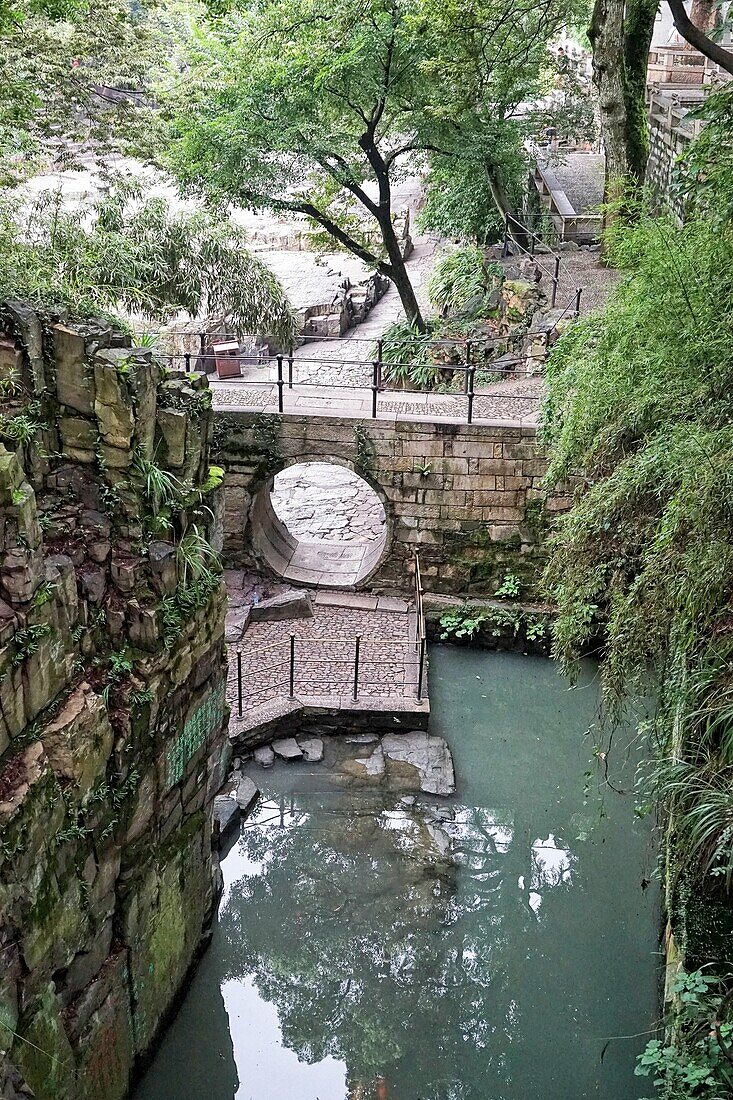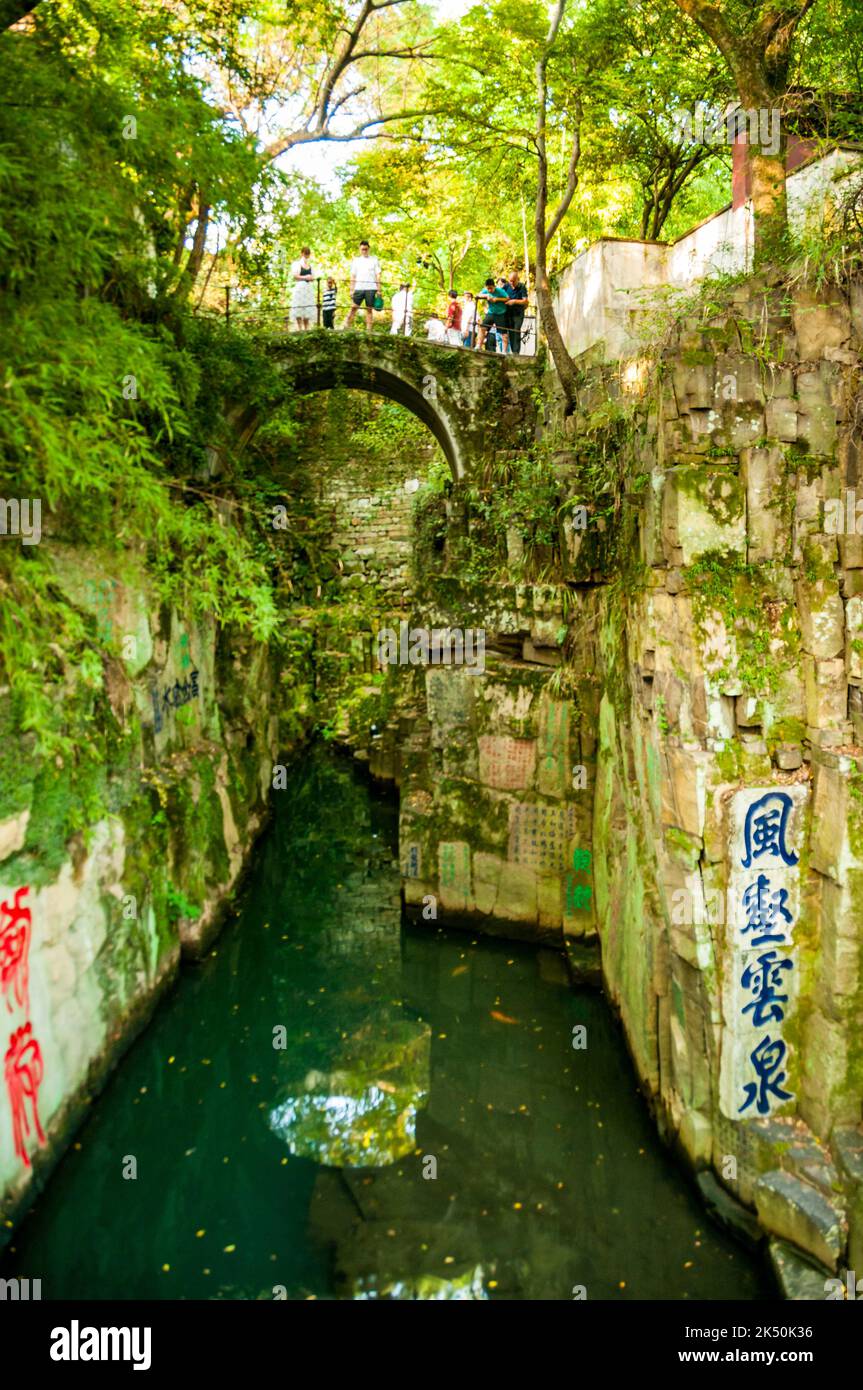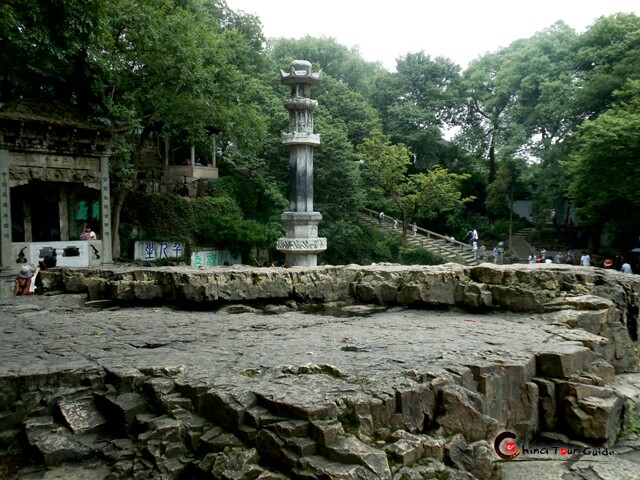Discover the Mystique of Huqiu Sword Pool: A Dive into Ancient Chinese Legends

An Essential Guide to Visiting Huqiu Sword Pool
Nestled within the enchanting landscapes of Tiger Hill in Suzhou, the Huqiu Sword Pool (剑池) stands as a testament to ancient legends and martial prowess. This iconic site, shaped remarkably like a sword, is steeped in history and mystery, making it a must-visit for any traveler eager to immerse themselves in China’s rich cultural heritage.
The Sword Pool is not only a captivating visual landmark but also a storied location where it is said that the legendary swords of the Wu Kingdom were buried alongside its king, He Lu. Imagine the tales that have echoed through the centuries as emperors and warriors sought the finest blades in this very spot!
In this guide, we will delve into the fascinating history of the Sword Pool, explore its architectural significance, and provide practical tips for your visit, including the best times to go and how to navigate the surrounding Tiger Hill Scenic Area. Get ready to step back in time and discover the allure of Huqiu Sword Pool—where history meets legend in a breathtaking setting.
In This Guide
- An Essential Guide to Visiting Huqiu Sword Pool
- The Rich History and Legends of Huqiu Sword Pool
- Main Highlights: What You Absolutely Can’t Miss
- Planning Your Visit: A Practical Guide
- Tickets: Prices, Booking, and Tips
- How to Get There: A Complete Transportation Guide
- Local Cuisine and Accommodation Nearby
- Frequently Asked Questions
- Final Thoughts on Your Trip
The Rich History and Legends of Huqiu Sword Pool
An Enigmatic Legacy: The History of Huqiu Sword Pool
Nestled within the mystical landscape of Tiger Hill, the Huqiu Sword Pool (剑池) is not merely a body of water; it is a storied relic steeped in the rich tapestry of Chinese history and legend. As you approach this renowned landmark, prepare to be transported through time, where each ripple of water whispers tales of the past.
The Birth of a Legend
The origins of Sword Pool date back to the Spring and Autumn Period (770–476 BC), a time of great turmoil and cultural flourishing in China. It is said that the pool was created as a resting place for the renowned swords of King He Lu of the Wu State, who was famous for his obsession with swordsmanship. Legend has it that the king, a fervent admirer of blades, commissioned the master swordsmiths Gan Jiang and Mo Ye to forge a sword of unparalleled sharpness. Upon testing the edge of this weapon against a stone, the blade sliced through it effortlessly, symbolizing the king’s might and the craftsmanship of the era.
A Repository of Swords
Sword Pool is often said to house the remains of 3,000 swords buried alongside King He Lu, each imbued with the spirit of its maker. This historical burial site not only signifies the king’s reverence for combat but also highlights the artistry behind Chinese sword-making. Throughout the centuries, skilled artisans have visited this sacred place, hoping to draw inspiration from the very essence of these legendary blades.
The Visits of Great Leaders
The allure of Sword Pool has drawn many notable figures throughout history, including Emperor Qinshihuang, the first emperor of a unified China, and Sun Quan, a warlord from the Three Kingdoms period. Both leaders sought the legendary swords said to be hidden within the pool’s depths, further enhancing its reputation as a treasure trove of martial heritage. These visits underscore the significance of Sword Pool, not only as a landmark but as a critical intersection of power and artistry in ancient China.
The Pool’s Mystical Charm
Beyond its historical significance, the Sword Pool is steeped in legends that add an air of mystique to its presence. One such legend tells of a celestial dragon that guards the pool, ensuring that only those worthy may access its waters. It is said that the dragon can be seen on stormy nights, swirling through the mists above the pool, a guardian of the swords that lie beneath.
Modern-Day Reverence
Today, the Huqiu Sword Pool remains a revered site for both tourists and scholars alike. Visitors are drawn not only by its enchanting beauty but also by the opportunity to connect with the legends that have transcended time. As you stand by the pool, you can almost hear the echoes of ancient battles and the clang of swords resonating in the air, leaving an indelible mark on your journey through the historical landscape of Suzhou.
Conclusion
The Huqiu Sword Pool is more than just a picturesque spot in the heart of Tiger Hill; it is a keeper of stories that span over two millennia. Each visit to this hallowed ground invites travelers to immerse themselves in the legends of old while appreciating the craftsmanship and cultural significance of Chinese sword-making. As you explore this enchanting site, you become part of its ongoing narrative, connecting the past with the present in a truly memorable way.

Huqiu Sword Pool.
Main Highlights: What You Absolutely Can’t Miss
1. Tiger Hill Pagoda (Hu Qiu Ta, 虎丘塔)
Standing proudly at the top of Tiger Hill, the Tiger Hill Pagoda is a striking example of ancient Chinese architecture, revered as the oldest and largest pagoda south of the Yangtze River. With its unique 7-story, 8-sided double-wall design, this leaning marvel—often likened to the Leaning Tower of Pisa—offers a captivating glimpse into history. As you ascend and explore its intricate details, don’t miss the breathtaking views of the surrounding landscapes. Tip: Visit early in the morning to catch the sunrise illuminating the pagoda, creating stunning photographic opportunities.
2. Sword Pool (Jianchi, 剑池)
The Sword Pool is a fascinating landmark shaped like a sword, steeped in legend and history. According to lore, over 3,000 swords were buried here with the King He Lu, making it a significant site for sword enthusiasts and history buffs alike. The tranquil waters reflect the surrounding greenery, providing a serene backdrop for contemplation. Tip: Take a moment to sit by the pool and imagine the ancient tales of swordsmiths and warriors; it’s a perfect spot for relaxation and reflection.
3. Sword Testing Stone (Shi Jian Shi, 试剑石)
Just a short walk from the Sword Pool, the Sword Testing Stone is a striking natural rock formation that bears the mark of history. Legend has it that King He Lu tested the sharpness of his famous swords on this very stone. The crack running through it speaks volumes of its legendary past. Tip: Bring a small sword or a replica for a fun photo op, pretending to test your own sword against the legendary stone!
4. Broken Beam Hall (Duan Liang Dian, 断梁殿)
This intriguing structure, made entirely of bamboo and wood, showcases the craftsmanship of the Yuan Dynasty. Within the hall, four stone tablets known as the Echoing Tablets recount the history of Tiger Hill and its iconic pagoda. When struck, these tablets produce a haunting echo that reverberates through the hall. Tip: Engage with the tablets by gently knocking them; the sound is not only mesmerizing but also a unique way to connect with the past.
5. The Scenic Pathways
As you explore the lush surroundings of Tiger Hill, take time to wander along the scenic pathways that wind through gardens, ancient trees, and historical relics. Each turn reveals a new vantage point of the pagoda and the picturesque landscape. Tip: Wear comfortable shoes to fully enjoy the hike; consider visiting in spring or autumn when the foliage adds vibrant colors to your expedition.
6. The Legend of the White Tiger
Intricately tied to the history of Tiger Hill is the legend of the White Tiger, which is said to have appeared three days after King He Lu was laid to rest. This mythical creature symbolizes strength and bravery, and the tale offers a glimpse into the rich cultural tapestry of the site. Tip: Take a guided tour to hear the full story and gain insights from local historians, adding depth to your visit.
7. Sunset Viewing Point
To cap off your visit, make your way to one of the designated sunset viewing points around Tiger Hill. The breathtaking views as the sun dips below the horizon create a spectacular display of colors that reflect on the pagoda and the waters below. Tip: Bring a snack and a drink to enjoy as you soak in the beauty; it’s a magical way to conclude your day at this historic site.
With its blend of natural beauty and rich history, a visit to Huqiu Sword Pool is an unforgettable experience that immerses you in the legends and landscapes of ancient China.

Huqiu Sword Pool.
Planning Your Visit: A Practical Guide
Best Time to Visit
The ideal time to explore Huqiu Sword Pool is during the spring and autumn months, specifically from April to June and September to November. During these periods, the weather is typically mild and pleasant, allowing you to fully appreciate the lush greenery and historical architecture. The summer can be hot and humid, while winters may be chilly, but the site remains open year-round for visitors willing to brave the elements.
Recommended Itinerary
To make the most of your visit, consider spending approximately 2-3 hours at Tiger Hill (Huqiu). Here’s a suggested itinerary:
- Arrival: Plan to arrive early in the morning when the site opens (07:30 AM during peak season).
- Explore the Pagoda: Start at the iconic Tiger Hill Pagoda, taking time to appreciate its unique architecture and the surrounding gardens.
- Visit the Sword Pool: Next, head to the Sword Pool, where you can soak in the historical significance and the legends of buried swords.
- Sword Testing Stone: Don’t miss the Sword Testing Stone, and learn about the fascinating tales of King He Lu and his legendary swords.
- Relax and Reflect: Finally, take a leisurely stroll around the grounds, perhaps enjoying a quiet moment by the picturesque landscapes.
Photography Tips
- Golden Hour: For the best lighting, visit early in the morning or late in the afternoon. The soft light enhances the beauty of the pagoda and the surrounding scenery.
- Wide-Angle Shots: Bring a wide-angle lens to capture the grandeur of the pagoda and its surroundings.
- Details Matter: Focus on architectural details and natural elements, such as the intricate carvings on the pagoda or the serene reflections in the Sword Pool.
- Local Flora: Don’t forget to photograph the seasonal flowers that bloom throughout the area, adding bursts of color to your shots.
What to Wear
- Comfortable Footwear: Expect to do some walking; wear comfortable shoes suitable for uneven terrain.
- Layered Clothing: Dress in layers to accommodate changing weather conditions, especially if you’re visiting in spring or autumn.
- Sun Protection: If you’re visiting during the summer, don’t forget a hat, sunglasses, and sunscreen to protect against the sun.
Insider Tips
- Visit on Weekdays: To avoid crowds, plan your visit on a weekday. This will allow for a more peaceful experience and better photo opportunities.
- Guided Tours: Consider joining a guided tour for deeper insights into the history and legends surrounding Huqiu Sword Pool. Knowledgeable guides can enrich your visit with fascinating stories.
- Sample Local Snacks: After exploring, indulge in some local snacks from nearby vendors. Suzhou is known for its delightful street food!
- Bring Water: Stay hydrated, especially during warmer months. There are limited facilities for refreshments within the park.
- Check for Events: Keep an eye out for cultural performances or seasonal festivals that may be taking place during your visit, adding an extra layer of enjoyment to your experience.
By following this guide, you can ensure a memorable visit to Huqiu Sword Pool, immersing yourself in the rich history and breathtaking scenery of one of Suzhou’s most cherished landmarks.

Huqiu Sword Pool.
Tickets: Prices, Booking, and Tips
When planning your visit to the enchanting Huqiu Sword Pool, it’s essential to know about ticket options, pricing, and booking tips to ensure a seamless experience at this iconic Suzhou landmark. Below is a comprehensive breakdown of the ticket information along with guidance on how to secure your entry.
| Ticket Type | Price (CNY) | Includes |
|---|---|---|
| Adult Ticket | 70 | Entry to the Sword Pool and surrounding attractions. |
| Adult Ticket (Off-Season) | 60 | Entry to the Sword Pool and surrounding attractions. |
| Children (under 1.2m) | Free | Entry to the Sword Pool (must be accompanied by an adult). |
| Senior Ticket | 50 | Entry for seniors aged 60 and above (valid ID required). |
Booking Tips
1. Book in Advance:
To avoid long queues and ensure your preferred visiting time, it’s highly recommended to book your tickets online ahead of your visit. Many travelers opt for local travel agencies or platforms that specialize in Chinese attractions, as they often provide quick booking options and instant confirmations.
2. Check for Discounts:
Make sure to check if any discounts apply, especially for seniors or family packages. Some platforms may also offer bundled deals that include additional attractions or guided tours around Suzhou.
3. Be Mindful of the Seasons:
The ticket prices vary depending on the season; thus, planning your visit during the off-peak months can save you some money. The peak season typically runs from May to October, where prices are at their highest.
4. Group Bookings:
If you are traveling with a group, inquire about group rates or packages that might provide additional savings.
5. Contact for Assistance:
Should you have any questions or need assistance with your booking, feel free to reach out to local travel agencies or the official ticketing platforms. They often have multilingual support to cater to international travelers.
By following these tips and organizing your ticketing in advance, you’ll be able to enjoy the beauty and history of Huqiu Sword Pool with ease and comfort. Safe travels!
How to Get There: A Complete Transportation Guide
Accessing Huqiu Sword Pool
Exploring the historical and cultural marvels of Suzhou, particularly the Huqiu Sword Pool, is an experience not to be missed. Here’s how to get there from major cities and navigate around the scenic area.
From the Nearest Major City
Getting to Suzhou from Shanghai
- By Train: The fastest way to reach Suzhou from Shanghai is by high-speed train, which runs frequently throughout the day.
- Duration: Approximately 25-30 minutes.
- Cost: Around CNY 30-50 (approximately USD 5-8) for a second-class ticket.
-
Departure Stations: Trains depart from Shanghai Hongqiao Railway Station or Shanghai Railway Station.
-
By Bus: Long-distance buses are also available, albeit slower than trains.
- Duration: Approximately 1.5 to 2 hours.
- Cost: Around CNY 20-30 (approximately USD 3-5).
- Departure Points: Buses leave from various locations in Shanghai, including Shanghai Passenger Transport Station.
Getting to Tiger Hill from Suzhou City Center
- By Taxi: The easiest and most direct way to reach Huqiu Sword Pool from the center of Suzhou is by taxi.
- Duration: About 20-30 minutes, depending on traffic.
-
Cost: Approximately CNY 30-50 (around USD 5-8).
-
By Public Bus: For a more economical option, public buses are available.
- Bus Lines: Line 1, Line 34, and Line 88 all stop near Tiger Hill.
- Duration: Approximately 30-45 minutes.
- Cost: Around CNY 2 (about USD 0.30).
Getting Around the Scenic Area
Once you arrive at the Tiger Hill Scenic Area, including the Huqiu Sword Pool, getting around is quite straightforward.
-
On Foot: The scenic area is designed for walking, with well-marked paths leading to various attractions, including the Sword Pool, the Leaning Pagoda, and the Broken Beam Hall. Plan to spend 2-3 hours exploring the area.
-
Electric Carts: If you prefer not to walk, electric carts are available for hire within the scenic area. They can take you to key points of interest.
-
Cost: Typically around CNY 20-30 (approximately USD 3-5) for a short ride.
-
Guided Tours: Consider joining a guided tour that often includes transportation from Suzhou’s city center. This option can provide enriching insights into the historical significance of the area.
- Cost: Prices vary depending on the tour package but expect to pay from CNY 200 (approximately USD 30) and up.
Final Tips
Be sure to check train schedules and book tickets in advance, especially during peak travel seasons. The scenic area is open year-round, making it accessible regardless of when you visit. Enjoy your journey to Huqiu Sword Pool, a place steeped in history and legend!

Huqiu Sword Pool.
Local Cuisine and Accommodation Nearby
Exploring the enchanting surroundings of Huqiu Sword Pool (虎丘剑池) is not just about soaking in the historical significance and stunning landscapes; it’s also an opportunity to savor the delectable local cuisine and find a comfortable place to stay. Here’s a guide to some must-try dishes and accommodation options nearby.
Culinary Delights
-
Suzhou-Style Buns (苏式汤包)
These delicate steamed buns are a local favorite, often filled with a mix of minced pork and a rich, savory broth. The buns are served hot, and the best way to enjoy them is to gently bite the top, allowing the flavorful soup to flow out before savoring the rest. -
Squirrel-Shaped Mandarin Fish (松鼠桂鱼)
A signature dish of Suzhou, this culinary masterpiece features a whole fish that is deep-fried and shaped like a squirrel, then topped with a sweet and sour sauce. Its crispy exterior and tender, flaky meat make for a delightful combination that’s sure to impress. -
Eight-Treasure Rice Pudding (八宝饭)
This traditional dessert is a must-try. It’s made from glutinous rice and is filled with a variety of sweet ingredients such as red bean paste, dried fruits, and nuts. The dish is often garnished with colorful fruits, making it not only delicious but also visually appealing. -
Drunken Chicken (醉鸡)
A cold dish that features chicken marinated in Shaoxing wine, garlic, and ginger, resulting in tender meat with a distinct flavor. It’s a refreshing dish, perfect for a warm day, and is often served as an appetizer or part of a larger meal.
Where to Stay
Luxury Option: Pan Pacific Suzhou
Nestled along the picturesque Jinji Lake, Pan Pacific Suzhou offers opulent accommodations with stunning views and exceptional service. The hotel features elegant rooms, a world-class spa, and multiple dining options, making it a perfect retreat after a day exploring Tiger Hill.
Boutique Option: Hotel Soul Suzhou
This chic boutique hotel is known for its artistic design and personalized service. Located in the heart of Suzhou, it provides easy access to local attractions, including Huqiu Sword Pool. Guests can enjoy a unique blend of modern comfort and traditional Chinese aesthetics, along with a delightful café and bar.
Budget Option: Suzhou Lanting Youth Hostel
For travelers on a budget, Suzhou Lanting Youth Hostel is a fantastic choice. It offers clean, comfortable dormitory-style accommodation and affordable private rooms. The hostel’s communal areas are great for meeting fellow travelers, and its friendly staff can help guide you to nearby attractions.
Whether you are indulging in the local cuisine or resting in one of the nearby accommodations, your visit to Huqiu Sword Pool will be a memorable experience filled with flavors and comfort. Enjoy your journey!

Huqiu Sword Pool.
Frequently Asked Questions
Frequently Asked Questions about Huqiu Sword Pool
-
Is Huqiu Sword Pool suitable for children and the elderly?
Yes, Huqiu Sword Pool is accessible and suitable for families with children and elderly visitors. The pathways are well-maintained, though there are some steep areas. It’s advisable for elderly visitors to take their time and consider using walking aids if needed. -
Are there English signs and information available?
Yes, you will find English signs throughout the Huqiu Sword Pool area. Additionally, many of the staff members can communicate in basic English, making it easier for international visitors to navigate and understand the site’s historical significance. -
How much time should I plan to spend at Huqiu Sword Pool?
We recommend allocating about 2 to 3 hours for your visit to the Huqiu Sword Pool. This will give you ample time to explore the site, take photographs, and appreciate the historical and cultural aspects of the area without feeling rushed. -
What are the opening hours for Huqiu Sword Pool?
The Huqiu Sword Pool is generally open from 7:30 AM to 6:00 PM during the peak season (May to October) and from 7:30 AM to 5:30 PM in the off-peak season (November to April). It’s a good idea to check the specific dates before your visit, as hours may vary. -
Is there an admission fee to visit Huqiu Sword Pool?
Yes, there is an admission fee to enter the Huqiu Sword Pool area. The ticket price is CNY 70 during the peak season and CNY 60 during the off-peak season. Be sure to bring cash or a mobile payment option, as card payments may not be accepted everywhere. -
What should I wear when visiting Huqiu Sword Pool?
Comfortable clothing and sturdy walking shoes are recommended, as you may encounter uneven paths and some inclines. Depending on the season, consider bringing a hat and sunscreen for sunny days, or an umbrella for unexpected rain. -
Are there facilities such as restrooms and food options nearby?
Yes, there are restrooms available within the Huqiu Sword Pool area. While there are some snack vendors, it’s advisable to bring your own water and snacks, especially if you’re visiting with children. -
How can I get to Huqiu Sword Pool from the city center?
Huqiu Sword Pool is easily accessible from central Suzhou. You can take a taxi, which is a convenient option, or use public transport such as buses. The area is well-signposted, and local buses frequently run to Tiger Hill, where Huqiu Sword Pool is located.
Final Thoughts on Your Trip
As your journey at the Huqiu Sword Pool comes to a close, take a moment to reflect on the enchanting blend of history and legend that permeates this remarkable site. From the ancient tales of He Lu and his quest for the perfect sword to the striking architecture of the Tiger Hill Pagoda, each corner of this destination tells a story that resonates through time.
Wandering through the lush landscapes and discovering the intriguing relics, like the Sword Testing Stone and the serene waters of the Sword Pool, allows you to connect with China’s rich cultural heritage. Remember, visiting the Huqiu Sword Pool is not just about witnessing a historical site; it’s about immersing yourself in the myths and aspirations that shaped an entire civilization.
As you leave this captivating place, carry with you the wisdom of the ages and the spirit of adventure that awaits in every corner of the world. May your travels continue to inspire and enrich your life, encouraging you to seek out the stories and wonders that lie ahead. Safe travels!